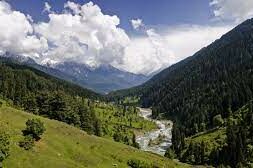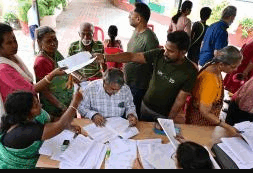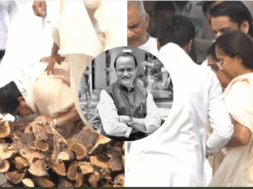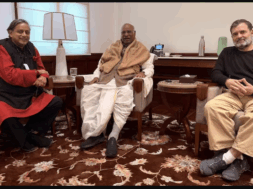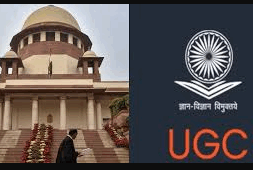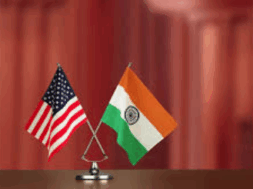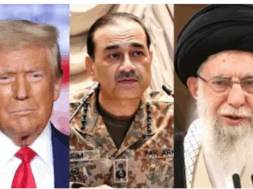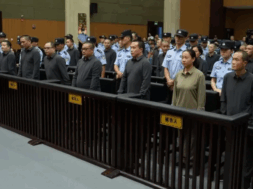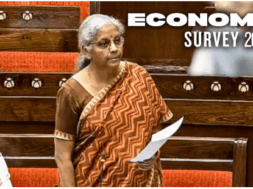
Govt Claims Jammu and Kashmir Ready for Holding Elections but No Timeframe for Restoration of Statehood
Manas Dasgupta
NEW DELHI, Aug 31: The Centre on Thursday conveyed to the Supreme Court its inability to commit to an exact timeframe within which the full statehood would be restored to Jammu and Kashmir but it was ready for holding elections any time now.
The decision on the timings for holding the elections lie with the Election Commission of India and the Jammu and Kashmir poll panel, the apex court was told.
A five-judge bench headed by Chief Justice DY Chandrachud was told by Solicitor General Tushar Mehta that the elections in Jammu and Kashmir would be held in three stages – first panchayat polls, second municipal polls and then legislative assembly polls. The Court was told on Tuesday that Ladakh, which was part of Jammu and Kashmir state earlier, would continue to remain a Union Territory.
The statements came during the hearing of a bunch of petitions challenging the scrapping of Article 370. The Centre had earlier argued that Jammu and Kashmir was one of a kind and the bifurcation was needed.
Mehta said the Election Commission had been doing the groundwork for elections in the erstwhile State. “Till date, the updating of the voter list was going on. This is substantially over, only some part remains. The Election Commission is doing it,” Mehta said.
He said the three-tier polls in Jammu and Kashmir would be held for the first time after 2019. These would include elections to panchayats (rural areas), municipality and to the Assembly. As for Ladakh, Mehta said the Leh part of the elections were already over. The Kargil portion would be conducted in September.
In its last hearing on Tuesday, the Supreme Court had laid emphasis on the need to restore democracy in J&K, which has been without an elected government since June 2018. During today’s hearing, the Centre though refused to provide a timeframe on restoration of Jammu and Kashmir’s statehood but the situation was conducive enough to hold elections.
Appearing before the Constitution Bench, Mehta assured the court that the Union Territory status of Jammu and Kashmir was only a “temporary phenomenon.” Mehta had on Tuesday sought time till August 31 to get instructions from the government about a time frame by which Jammu and Kashmir would revert to Statehood following bifurcation in August 2019. The erstwhile State was reorganised into the Union Territories of Jammu and Kashmir and Ladakh. Ladakh would continue to be a Union Territory unlike Jammu and Kashmir, the Centre had said on Tuesday.
“I am unable to give an exact time period right now for the Statehood. Complete Statehood may take some time as the State had faced repeated and consistent disturbances for decades together… I assure you we are progressively proceeding to make Jammu and Kashmir a complete State,” Mehta submitted.
He said Jammu and Kashmir became a Union Territory in an “extraordinarily extreme situation.” Its progress towards Statehood needs to be “infused” with investments. He said the Centre was catalysing the progress to Statehood by pumping investments to the tune of ₹28,400 crore. There were investment proposals, besides that of the Centre, worth ₹ 78,000 crore.
Actual investments have been so far ₹2,153 crore. Mehta said e-initiatives in Jammu and Kashmir have jumped from ₹9,218 crore in 2018 to ₹92,560 crore now. He said 32 out of a total 53 infrastructural projects worth ₹58,477 crore have been completed under the Prime Minister’s Development Package.
Mehta said Jammu and Kashmir had seen “enormous changes” post abrogation of Article 370 in 2019. Terrorism, infiltration, stone-pelting and casualties among security personnel have reduced by 45.2%, 90.2%, 97.2% and 65.9%, respectively. He said there were 1,767 incidents of secessionist-spurred stone-pelting in Jammu and Kashmir in 2018. “Now it is nil… In 2018, there were 52 instances of organised bandhs, now it is nil,” the Solicitor General said.
Senior advocate Kapil Sibal, for the petitioners, objected to Mehta presenting figures in court to prove his case that an “enormous change” happened after abrogation. “They had 5,000 people under house arrest and Section 144 [curfew] was ordered across the State… Then how could there be any bandh… People could not go to the hospital… His statements in court become part of public space. These proceedings are televised, recorded… These figures are irrelevant to the challenge,” Sibal said.
Chief Justice Chandrachud said these figures would only be considered as the Centre’s efforts to restore Statehood to Jammu and Kashmir. The constitutional challenge to the abrogation of article 370 would have to be answered by the Centre on constitutional grounds, and not by quoting these statistics at the court.
“The development work the government says it has undertaken post August 2019 is not relevant to the constitutional challenge… From what you [government] has told us so far, we understand that the roadmap to full Statehood would take time. Right now development work is taking place. Some stability has to be brought about. The Union Territory status of Jammu and Kashmir is not a permanent arrangement… That is, you are envisioning a move from Union Territory to State again, but you cannot give a fixed time by which this can be done,” the Chief Justice addressed Mehta, who agreed with the summing up.
Leaders and petitioners from Ladakh have expressed their disappointment over The Solicitor General’s statement that Ladakh will remain a Union Territory. Over the last two years, there have been massive protests in Ladakh demanding statehood for the region.
Tushar Mehta and senior advocate Kapil Sibal were at one stage involved in a high-intensity argument in the court as Mehta, arguing for the government, rolled out figures to claim success for the government in improving the law and order situation in the once-terrorist infested region.
Sibal, who is representing some of the petitioners, took a sarcastic swipe at that remark, asking “how can there be a band of dharna (if) 5,000 people (are) in house arrest Section 144 was imposed”. He urged the government not to make a “mockery of democracy.” “So how can there be a bandh or dharna? This court has accepted in a judgment that the internet was closed… and then they are saying that there was no shutdown?” he asked, “How can there be a bandh when people couldn’t even go to the hospital?”
An irate Mr Sibal continued to hit out, noting, “The problem is this (the hearing) is being televised and all of this is on record. They make it like, ‘look what all government is doing’.” The Solicitor General countered saying “progress never creates problem.”
The Chief Justice played the role of peacemaker in this debate, saying, “Constitutional issue will be dealt only with the constitutional angle and not on the basis of the policy decisions.” “Right from the beginning of the hearing, we have heard this case in a fair manner… in the spirit of fairness. We request both sides to maintain it at the same level,” he urged.
On Monday the government told the court J&K’s present status is not permanent and that statehood will be restored. “It is necessary, for some time, that J&K remains under the Union as a Union Territory… ultimately J&K will become a state (again),” Mehta had said.
